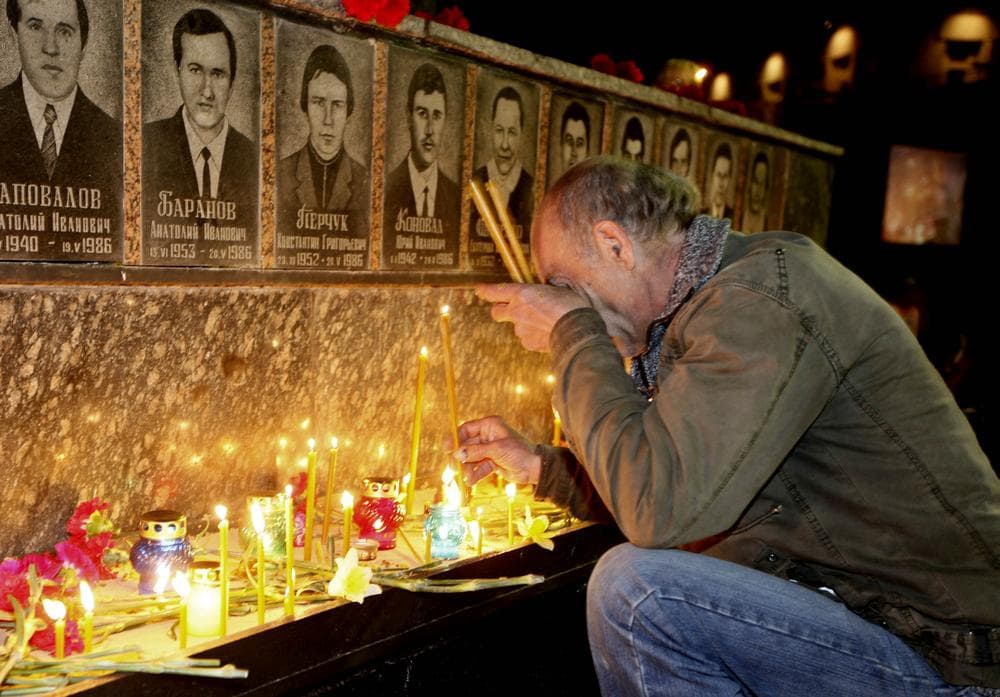Advertisement
Essay: Chernobyl Revisited

Today is the 25th anniversary of the Chernobyl nuclear accident, and I woke up today thinking about that terrible event because I saw the consequences up close 16 years ago.
Back then, I made two trips to Ukraine to report on the fallout of what Ukrainians refer to simply as "the catastrophe."
Over the years, we've heard a lot about the accident — how an explosion and fire at reactor No. 4 released a huge radioactive cloud into the atmosphere that spread across much of Ukraine, Belarus, western Russia and parts of Europe. It was known then, as it is today, as the worst nuclear power plant accident in history.
When I was there, it was impossible to avoid talking about Chernobyl. It dominated the national conversation, consciousness and mood. In Ukraine, the Chernobyl catastrophe altered forever people's sense of security; it damaged whatever trust they might have had in their government, about what officials told them about their health, and about the safety of nuclear power.
Health officials around the world are still assessing the human cost of Chernobyl. We know for sure that dozens of firemen who rushed in to battle the initial conflagration were killed by acute radiation poisoning. Many of them were sent to their deaths without even realizing they were battling a nuclear meltdown. We know that many children born in Ukraine and Belarus after Chernobyl developed thyroid cancers as a result of Chernobyl. I saw some of these children in a Kiev clinic with tumors on their necks the size of grapefruits. There are also various estimates of many, many more cancers caused by Chernobyl, though researchers say teasing out the actual number of cancers and deaths caused by Chernobyl is not straightforward.
But to witness firsthand the fallout of a nuclear meltdown changes forever your perception of what technology can and cannot do; it makes you forever skeptical of government assurances that we are safe and in good hands.
Reactor No. 4 exploded on April 26. At first Soviet officials didn't let the world know what had actually happened. Just 65 miles south of Chernobyl in Kiev, authorities knew the truth but encouraged business as usual. They staged outdoor festivals, concerts and bicycle races as a radioactive cloud blew toward the city. Within days, radiation was detected by Swedish scientists in the skies above their country, and eventually, even the tight grip of Soviet authority couldn't hide the catastrophe.
When I visited Chernobyl, I traveled through a nuclear wasteland in the area known as "The Zone" that surrounds the stricken reactor. It was once rich farmland, and home to 126,000 people, all of whom were evacuated and resettled. I went into the once-busy city of Pripyat, where many Chernobyl workers and their families lived. Grass poked up through the cracked asphalt roads, and a rusted Ferris wheel stood idle in the eerily silent city. It was a ghost town. The buildings were as empty as the Soviet slogans painted on some of the walls that urged citizens to work hard for the homeland and the common good.
Sixteen years ago, I stayed with a family in Kiev who had two teenage daughters. They were often sick, and their mother was convinced it was because of Chernobyl. Many people in Kiev worried about this; they feared that the radiation was depressing their immune systems, making them more prone to sickness and depression. It's really not clear if Chernobyl caused their many ailments. Whether true or not, the fact that so many of them believed it, made at least their fears very real. And there's no doubt that the catastrophe altered their world forever.
This program aired on April 26, 2011.